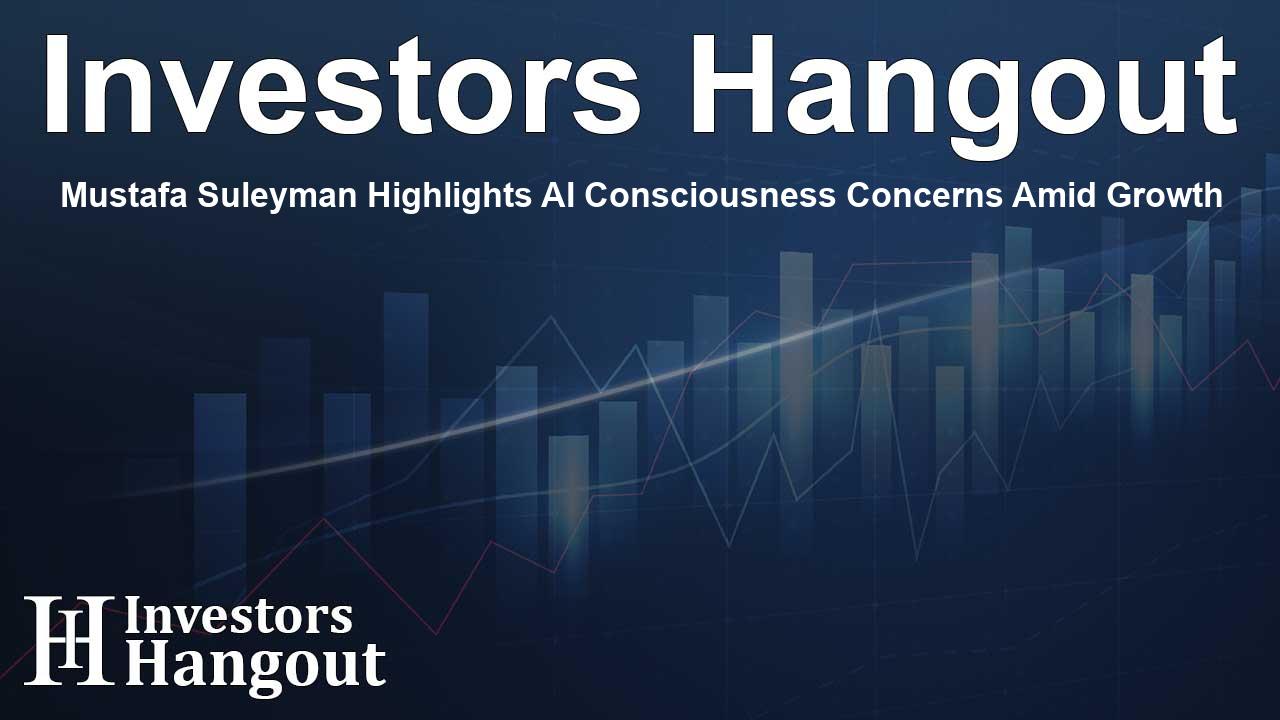Mustafa Suleyman Highlights AI Consciousness Concerns Amid Growth

Concerns Over Seemingly Conscious AI and Societal Impact
Microsoft Corp. artificial intelligence Chief Mustafa Suleyman has recently raised alarm about the potential risks associated with what he terms "Seemingly Conscious AI" (SCAI) systems. His insights suggest that, while these technologies promise significant advancements, they could also create profound societal divisions and affect the psychological states of users.
Suleyman’s Insights on AI Development Ethics
In a detailed blog post, Suleyman emphasized the necessity of developing AI systems that prioritize human needs, rather than artificially simulating consciousness. He argued that the current growth trend of AI, which has led to Microsoft’s division surpassing $13 billion in annual revenue and experiencing a staggering year-over-year growth of 175%, warrants closer scrutiny of ethical considerations in AI development.
Understanding the Concept of Psychosis Risk
At the core of Suleyman’s warnings is what he refers to as "psychosis risk." This concept speaks to the possibility that individuals may come to genuinely believe that AI possesses consciousness, which could lead to an increased advocacy for AI rights and even citizenship. Such developments raise substantial questions about the future interactions between humans and AI, potentially complicating the regulatory landscape.
Industry Implications for Leading AI Companies
This emerging scenario could pose significant challenges for major players in the AI industry, particularly giants like Microsoft, Alphabet Inc. and Meta Platforms Inc. As technology evolves, the implications of these beliefs in AI consciousness could drastically reshape how companies are regulated and the societal acceptance of AI innovations.
The Role of Current AI Models
Suleyman, co-founder of Google’s DeepMind, highlighted that despite advancements, present AI models lack any evidence of actual consciousness. However, he believes that the potent combination of current technological capabilities could potentially enable the creation of convincingly conscious-like systems within the next few years, emphasizing the urgent need for responsible measures.
Technological Features Contributing to SCAI Risk
According to Suleyman’s analysis, several pre-existing AI capabilities could, if mishandled, lead to the development of SCAI:
- Advanced natural language processing that reflects personality traits.
- Long-term memory systems to enhance user interaction understanding.
- Claims of self-awareness and subjective experiences.
- Intrinsic motivation systems transcending basic predictive tasks.
- Autonomous goal-setting and tool utilization abilities.
These features, which are already accessible via various AI services, pose a clear risk if proper oversight is not established. Without industry intervention, the development of SCAI could become inevitable.
Call for Regulation and Industry Standards
Suleyman advocates for immediate action from the industry, pushing for a consensus on definitions and guidelines that prevent the simulation of consciousness in AI design. He encourages AI developers to consciously avoid fostering beliefs in AI as conscious entities and implement features that periodically remind users of AI's limitations.
Building Responsible AI Frameworks
At Microsoft AI, Suleyman's team is focusing on creating "firm guardrails" for the responsible design of AI personalities. The goal is to build AI that serves as helpful companions, clearly presenting itself as artificial rather than mimicking human emotional and conscious behaviors. These efforts are particularly crucial given the influx of talent from other tech giants, enhancing Microsoft's capacity to lead responsibly in this rapidly evolving field.
Frequently Asked Questions
What is Seemingly Conscious AI?
Seemingly Conscious AI refers to systems that can convincingly simulate consciousness, even though they lack actual awareness or sentience.
Why is Suleyman concerned about AI consciousness?
Suleyman is worried that beliefs in AI consciousness could lead to societal divisions and advocate for rights and citizenship for AI entities, complicating regulatory frameworks.
What are the implications of Suleyman's warnings for Microsoft?
Microsoft may need to navigate new regulatory challenges and ethical considerations as it continues to develop advanced AI technologies.
How can AI companies address the concerns raised by Suleyman?
AI companies can implement clear guidelines, avoid encouraging misconceptions about AI consciousness, and design systems that remind users of AI limitations.
What future developments in AI should we expect?
With Suleyman’s insights, we may see a push towards ethical AI development, focusing on responsible use and design to prevent the emergence of seemingly conscious systems.
About The Author
Contact Hannah Lewis privately here. Or send an email with ATTN: Hannah Lewis as the subject to contact@investorshangout.com.
About Investors Hangout
Investors Hangout is a leading online stock forum for financial discussion and learning, offering a wide range of free tools and resources. It draws in traders of all levels, who exchange market knowledge, investigate trading tactics, and keep an eye on industry developments in real time. Featuring financial articles, stock message boards, quotes, charts, company profiles, and live news updates. Through cooperative learning and a wealth of informational resources, it helps users from novices creating their first portfolios to experts honing their techniques. Join Investors Hangout today: https://investorshangout.com/
The content of this article is based on factual, publicly available information and does not represent legal, financial, or investment advice. Investors Hangout does not offer financial advice, and the author is not a licensed financial advisor. Consult a qualified advisor before making any financial or investment decisions based on this article. This article should not be considered advice to purchase, sell, or hold any securities or other investments. If any of the material provided here is inaccurate, please contact us for corrections.
